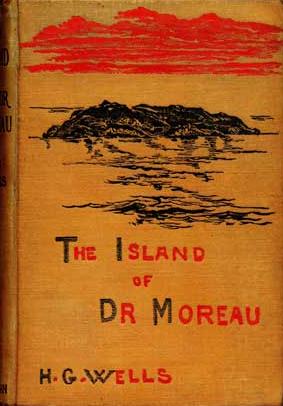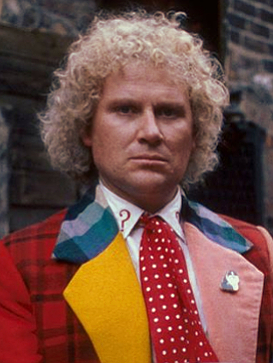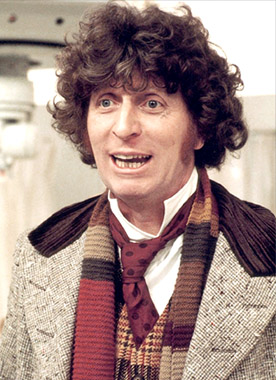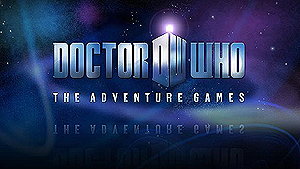Humour
As is characteristic of Freedman and Romero's work, much of the humour is derived from puns, although Theremin's abuse, Doctor Lilac's experiments (he is about to perform a bizarre experiment when Lord Zimbabwe first approaches him in each show; for example giving a woodlouse PMT) and interrupted diatribes, and Lord Zimbabwe's use of strange similes ("The secret to success, my dear Doctor, is like the aftermath of a Bombay banquet: one must keep going.") all contribute. Recurrent motifs include telephone calls from Sherlock Holmes seeking advice, and references to evil shape-changing pixie creatures (Agatha Christie's character Hercule Poirot appears in one episode; he blames all crimes on these pixie creatures.)
The influence of Douglas Adams's "The Hitchhiker's Guide to the Galaxy" can be detected, as in the doctor character, reminiscent of the HHGG psychiatrist.
Each show ends with Lord Zimbabwe saying "I think we handled that rather well," and Theremin answering "I couldn't agree less, sir."

Doctor Who is a British science fiction television series broadcast by the BBC since 1963. The series, created by Sydney Newman, C. E. Webber and Donald Wilson, depicts the adventures of an extraterrestrial being called the Doctor, part of a humanoid species called Time Lords. The Doctor travels in the universe and in time using a time travelling spaceship called the TARDIS, which externally appears as a British police box. While travelling, the Doctor works to save lives and liberate oppressed peoples by combating foes. The Doctor often travels with companions.

The Rani is a fictional character in the British BBC science fiction television series Doctor Who, portrayed by Kate O'Mara. She is a renegade Time Lord, and a nemesis of the series' title character, a Time Lord known as the Doctor. The Rani is an amoral biochemist who experiments on humans and other species, and considers everything secondary to her research. The character appeared in two classic serials, The Mark of the Rani (1985) and Time and the Rani (1987), before the original run of Doctor Who went off the air in 1989. The Rani later appeared as the principal villain in Dimensions in Time, a 1993 Doctor Who charity television special for BBC Children in Need. The character has since been featured in multiple Doctor Who audio dramas and novels.

The Three Doctors is the first serial of the tenth season of the British science fiction television series Doctor Who, first broadcast in four weekly parts on BBC1 from 30 December 1972 to 20 January 1973.

The Island of Doctor Moreau is an 1896 science fiction novel by English author H. G. Wells. It was published on 1 January 1896. The novel is set between 21 January 1887 to 5 January 1888. The text of the novel is the narration of Edward Prendick, a shipwrecked man rescued by a passing boat. He is left on the island home of Doctor Moreau, a mad scientist who creates human-like hybrid beings from animals via vivisection. The novel deals with a number of themes, including pain and cruelty, moral responsibility, human identity, human interference with nature, and the effects of trauma. Wells described it as "an exercise in youthful blasphemy."

Ian Chesterton is a fictional character in the British science fiction television series Doctor Who and a companion of the First Doctor. He was played in the series by William Russell and was one of the members of the programme's first regular cast, appearing in much of the first two seasons from 1963 to 1965. In a film adaptation of one of the serials, Dr. Who and the Daleks (1965), he was played by Roy Castle, but with a very different personality and backstory. Ian appeared in 16 stories and 77 episodes. He later returned for a cameo appearance, played once again by Russell, in the 2022 episode "The Power of the Doctor".

Sarah Jane Smith is a fictional character played by Elisabeth Sladen in the long-running BBC Television science fiction series Doctor Who and two of its spin-offs. Sarah Jane is a dogged investigative journalist who first encounters alien time traveller the Doctor while trying to break a story on a top secret research facility, and subsequently becomes his travelling companion on a series of adventures spanning the breadth of space and time. After travelling with The Doctor in four seasons of the show they suddenly part ways, and after this she continues to investigate strange goings-on back on Earth. Over time, Sarah Jane establishes herself as a committed defender of Earth from alien invasions and other threats, occasionally reuniting with The Doctor in the course of her own adventures, all the while continuing to work as a freelance investigative journalist.

The Doctor is the protagonist of the long-running BBC science fiction television series Doctor Who. An extraterrestrial Time Lord, the Doctor travels the universe in a time travelling spaceship called the TARDIS, often with companions. Since the show's inception in 1963, the character has been portrayed by fourteen lead actors. The transition to each succeeding actor is explained within the show's narrative through the plot device of regeneration, a biological function of Time Lords that allows a change of cellular structure and appearance with recovery following a mortal injury.

Ace is a fictional character played by Sophie Aldred in the long-running British science fiction television series Doctor Who. A 20th-century Earth teenager from the London suburb of Perivale, she is a companion of the Seventh Doctor and was a regular in the series from 1987 to 1989 and returned in 2022. She is considered one of the Doctor's most popular companions.

The Tenth Doctor is an incarnation of the Doctor, the protagonist of the British science fiction television series Doctor Who. He is played by David Tennant in three series and nine specials. The character has also appeared in other Doctor Who spin-offs. In 2023, Tennant returned to the role, this time as the fourteenth incarnation of the Doctor.

The Sixth Doctor is an incarnation of the Doctor, the protagonist of the British science fiction television series Doctor Who. He is portrayed by Colin Baker. Although his televisual time on the series was comparatively brief and turbulent, Baker has continued as the Sixth Doctor in Big Finish's range of original Doctor Who audio adventures.

The Fourth Doctor is an incarnation of the Doctor, the protagonist of the British science fiction television series Doctor Who. He is portrayed by Tom Baker.
The Macra Terror is the completely missing seventh serial of the fourth season in the British science fiction television series Doctor Who, which was first broadcast in four weekly parts from 11 March to 1 April 1967.

Fury from the Deep is the completely missing sixth serial of the fifth season in the British science fiction television series Doctor Who, which originally aired in six weekly parts from 16 March to 20 April 1968.

Zagreus is a 2003 Big Finish Productions audio drama based on the long-running British science fiction television series Doctor Who. This audio drama was presented on three compact discs, and was made by Big Finish as their primary release to celebrate forty years of Doctor Who. As of February 2015, it is being sold as a download.

Mary Shelley's 1818 novel Frankenstein; or, The Modern Prometheus, and the famous character of Frankenstein's monster, have influenced popular culture for at least a century. The work has inspired numerous films, television programs, video games and derivative works. The character of the Monster remains one of the most recognized icons in horror fiction.
"The Lazarus Experiment" is the sixth episode of the third series of the revived British science fiction television series Doctor Who. It was broadcast on BBC One on 5 May 2007 and stars David Tennant as the Tenth Doctor and Freema Agyeman as Martha Jones.
The Eternity Trap is a two-part story of The Sarah Jane Adventures which was first broadcast on CBBC on 5 and 6 November 2009. It is the fourth serial in the third series. The story involves the scientific investigation of a haunted house.

Doctor Who: The Adventure Games was an episodic adventure video game based on the BBC television series Doctor Who and developed by Sumo Digital.

The Phoenix is a British weekly story comic for children aged 7– 14, published by David Fickling Comics Ltd. The comic was launched on 7 January 2012 with a preview issue which was released in late 2011. The comic is often considered a successor to The DFC: both are published by the same people and many of The Phoenix's creators had worked on The DFC.














